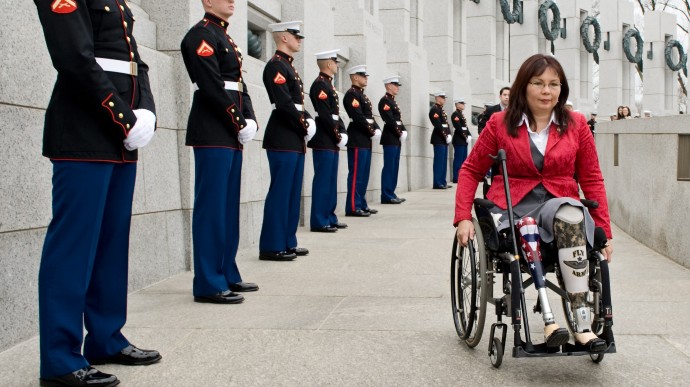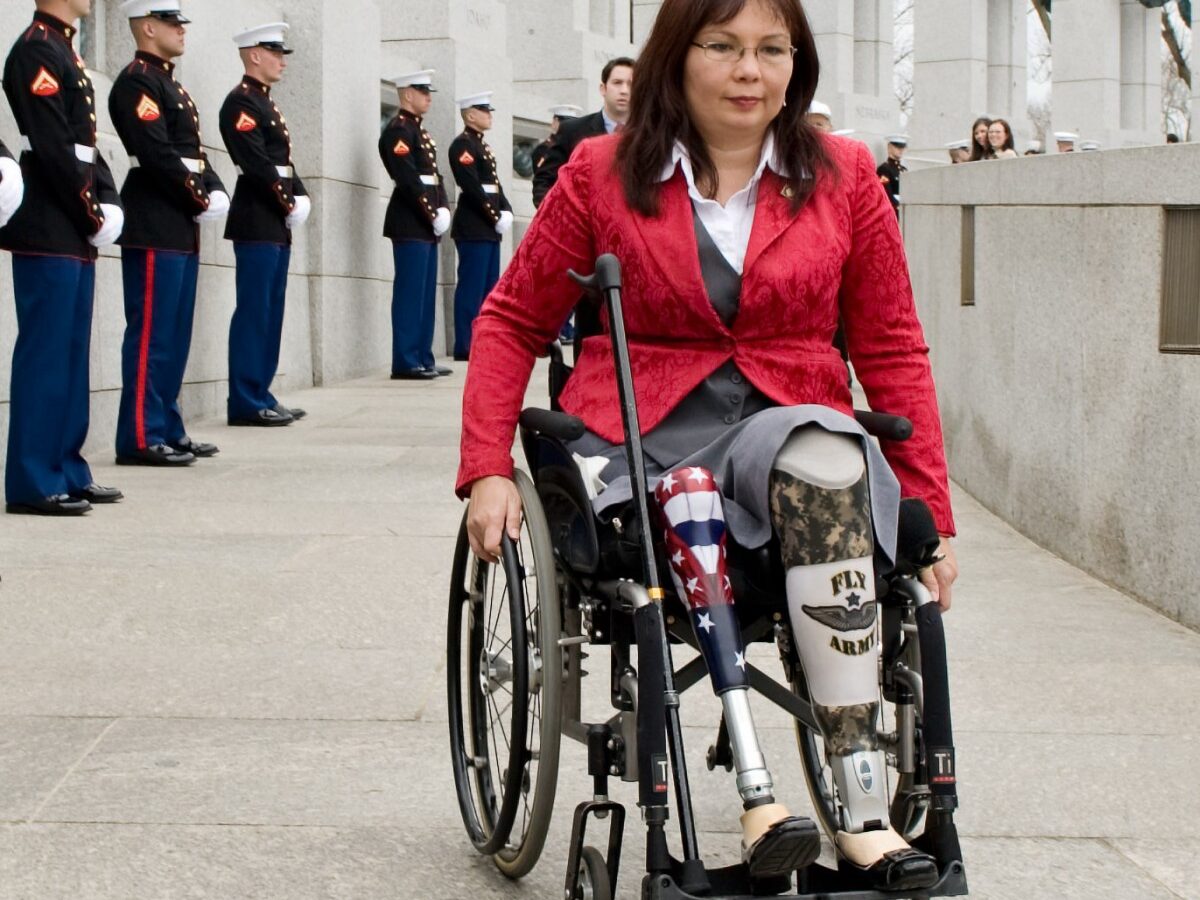
(NEW YORK) MintPress – Veterans Day may not be until next week, but many of those who served in Iraq and Afghanistan are already making their voices heard.
A record high 42 new veterans ran for Congress this year — by far the most that the post-9/11 generation of veterans has seen in national elections since the start of the wars — and 16 of these candidates won their bids on Tuesday
It is the first increase in lawmakers with military experience for 32 years and could add more weight to the importance assigned to veterans issues.
The winners come from both political parties in states and districts across the country, and they served in almost every branch of the military as well as in the Active-Duty Guard and Reserve.
“We are hopeful that these veterans will work together in Congress just like they did in combat and lead Washington in a new direction,” said Paul Rieckhoff, Founder and Executive Director of the Iraq and Afghanistan Veterans of America (IAVA) in a statement after the election results came out.
“These new veterans have an unprecedented opportunity to make progress on issues critical to the veteran community, to include employment, education, mental health care and VA reform,”he added. “Now that the election is over, we hope all Americans will unite around these new leaders to tackle these entrenched challenges.”
Some of them already have experience in the world of politics, like Rep. Steve Stivers (R-Ohio) and Rep. Duncan Hunter (R-Calif.), while others will be freshmen in Congress next year.
They include Tom Cotton, who was elected to represent Arkansas’s 4th District, a graduate of Harvard Law School who left his legal career to serve in the Army, deploying to Iraq as an infantry platoon leader in 2006 and later to Afghanistan in 2008 as an operations officer, and Brad Wenstrup, who deployed to Iraq in 2005 as a combat surgeon.
“They certainly do not agree on every policy position,” said Kate O’Gorman, Political Director for the IAVA in a blog post on the organizations’ website, “but two things unify them: They all were part of the less than one percent that served their countries in Iraq or Afghanistan, and they all returned home ready to continue serving in Congress.”
Women warriors
Voters also sent the first female veterans of Iraq and Afghanistan to Congress. Among them is Democrat Tammy Duckworth, who trounced tea party favorite Rep. Joe Walsh to win Illinois’ 8th Congressional District spanning Chicago’s northern suburbs.
Duckworth also became the first severely wounded veteran to be elected. While serving as a captain in the Army National Guard, she lost both of her legs and partial use of her right arm when her helicopter was shot down over Iraq in 2004.
“We are looking to her to really reach beyond politics and lead us all forward. She can be our generation’s John McCain or Max Cleland,” said IAVA Executive Director Paul Rieckhoff.
Arizona Sen. John McCain, the GOP’s 2008 presidential nominee, was shot down over North Vietnam in 1967, breaking both arms and a leg and becoming a prisoner of war. Cleland, a former Democratic senator from Georgia, earned the Silver Star and Bronze Star during the Vietnam War, losing both legs above the knee and his right forearm to a grenade explosion.
Duckworth was also the assistant secretary of veterans affairs in the first years of the Obama Administration and later the director of the Illinois Department of Veterans Affairs.
“I was honored to serve America’s Veterans over the past five years and will always be a voice for these heroic men and women,” she wrote on her website.
Also headed to Washington is Capt. Tulsi Gabbard, who won Hawaii’s 2nd District in a landslide victory over her opponent. Gabbard was a member of the Honolulu City Council, and in 2002 she was Hawaii’s youngest state representative.
She enlisted in the Hawaii Army National Guard in 2003 and resigned from the State House in 2004 to deploy with her unit to Iraq. In 2006, Gabbard returned to serve as a legislative aide for Sen. Daniel Akaka. She graduated from Officer Candidate School in March 2007, commissioned as a military police 2nd lieutenant and deployed with her unit again in 2008.
In Arizona’s 2nd District, Republican Martha McSally, a retired United States Air Force colonel,
is locked one of the races that is too close too call. She was the first American female to fly in combat since the 1991 lifting of the prohibition of women in combat, flying the A-10 over Iraq and Kuwait.
Storming the Hill
Throughout the election, the IAVA called on candidates from both parties to have a plan to address the issues facing veterans and their families.
At the top of the list is lowering the veteran unemployment rate. An average of 234,000 Iraq and Afghanistan vets were unemployed during 2011. The average new veteran unemployment rate for the year was 12.1 percent, three points higher than the national average, and the IAVA’s membership survey revealed an unemployment rate of 17 percent.
Defending New GI Bill education benefits is another priority. Since 2009, the post-9/11 GI Bill has put more than 650,000 veterans and their dependents through college. Thirty-seven of the benefits went to for-profit schools, but more than half of students enrolled left without a degree. And more than 1 in 5 students who attended a for-profit college defaulted on their student loan, compared to just 1 in 11 students at public and non-profit schools.
Rampant suicide among vets is also a major concern. As of today, more service members have died by suicide than have been killed in Afghanistan.
Part of the problem is the lack of care available through the Veterans Administration: More than half of veterans needing immediate mental health care at the VA have to wait an average of 50 days for a full evaluation.
Indeed, transforming the VA is high on the agenda. Only 53 percent of new veterans are registered with the VA, and more than half of the 1 million vets waiting for decisions on their disability claims have been waiting for more than 125 days.
Last but not least is the urgent need to support female veterans, who account for almost 12 percent of those who served in Iraq and Afghanistan. Additionally, 120 percent of female veterans have been diagnosed with PTSD, and 18.5 percent of women seeking VA healthcare screen positive for military sexual trauma. The suicide rate for female veterans is three times higher than for civilian women.
“As a country, we must continue to invest in the potential of this New Greatest Generation,” wrote the IAVA’s O’Gorman. The newly elected vets will have have the chance to spearhead that effort.
“These are folks who served overseas who came home and wanted to continue to serve. This has happened all the way back to George Washington and was true of (John) Kennedy, (Harry) Truman and the first President (George H.W.) Bush,” stated Rieckhoff.
“As George Washington said, ‘When we assumed the soldier, we did not lay aside the citizen.”


